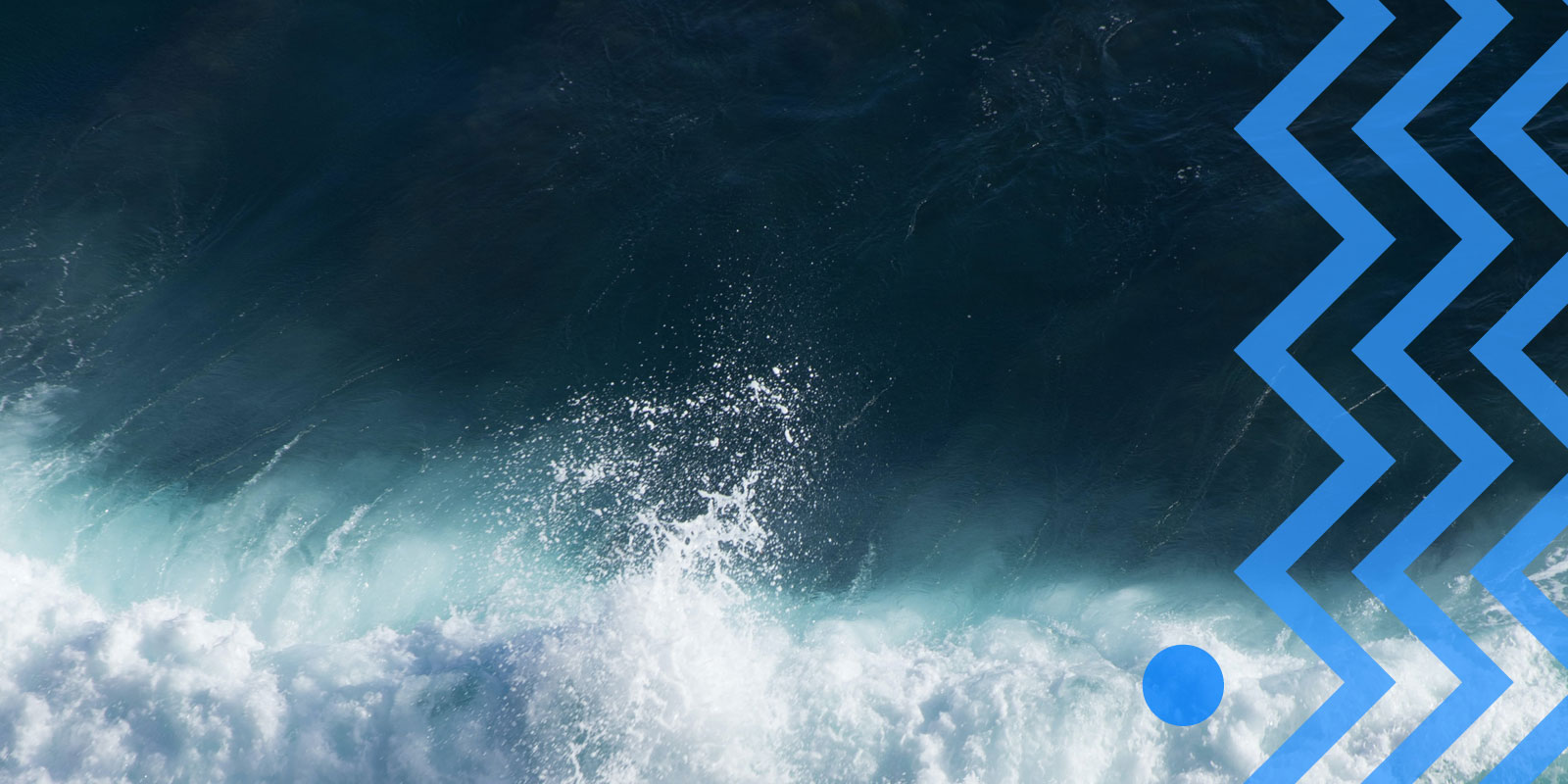
Blue Justice
Conference 2023
In March 2023, the world’s largest conference on fisheries crime, the Blue Justice Conference, was held at UN City, Copenhagen, Denmark. The conference, co-hosted by UNDP, the Norwegian Ministry of Trade, Industry and Fisheries and the Caribbean Regional Fisheries Mechanism (CRFM), brought together over 140 ministers, governmental representatives, operational experts, and civil society attendees from around the world for in-person discussions on fisheries crime and to plan coordinated action that will ensure a future sustainable and fair blue economy for all.
hrough the live stream, a further 758 people from around the world heard of the critical need to fight fisheries crime, a series of criminal activities throughout the fisheries’ value and supply, that damages fish stocks, threatens food security, exploits labour, and deprives states of billions of US dollars in lost revenue. The continued presence of fisheries crime in our oceans is severely hindering progress towards sustainable development. To respond, the Blue Justice Conference focussed on cooperative governmental action to combat fisheries crime, integral to the realisation of UN SDG 16 and 14. The resultant high-level commitments made at the conference represent a significant milestone in the progress towards our sustainable future.
Speaking at the conference about the fisheries crime in the Caribbean context, Milton Haughton, Executive Director of the CRFM, stated that:
“The pillage and plunder of our Marine Resources by illegal operators and their engagement in other criminal activities such as narcotics, small arms, and people trafficking are major concerns for us. These activities undermine the Investments and sacrifices of our governments and stakeholders to protect, manage and use our official resources sustainably. To improve economic development and eradicate poverty.”
Milton Haughton, Executive Director of the CRFM
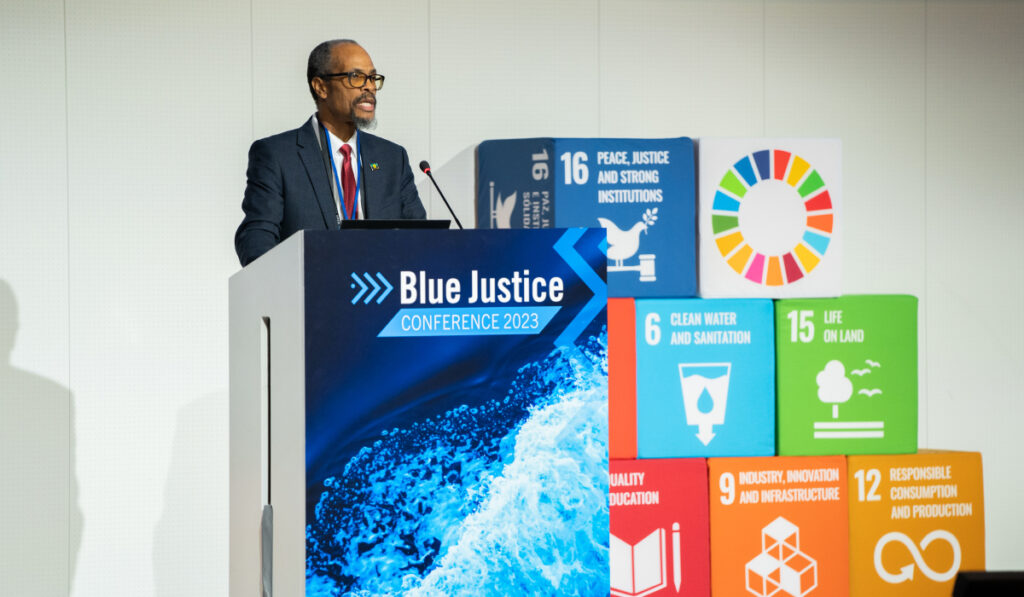
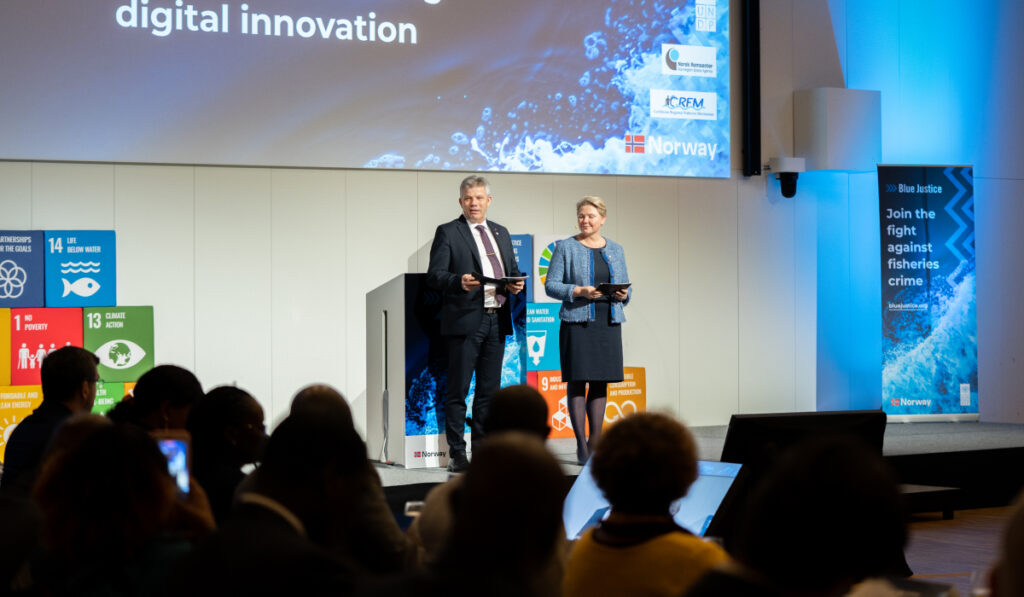
Norwegian Prime Minister Jonas Gahr Støre, opening the conference expressed full support for the Norwegian led Blue Justice initiative which, through promoting innovation, cooperation, and knowledge sharing, is fighting fisheries crime, and is working to ensure food security “today and for generations to come.”
H.E. Bjørnar Selnes Skjæran, Minister of Fisheries and Ocean Policy, Norway, stressed the need for future “blue economies that are sustainable, embracing economic opportunities, creating jobs and providing food while preserving the health of the ocean ecosystem.”
H.E. Bjørnar Selnes Skjæran, Minister of Fisheries and Ocean Policy, Norway
While H.E. Anne Beathe Tvinnereim, Norwegian Minister of International Development, spoke of the challenge of food security and the vital role our oceans must play to meet this need sustainably.
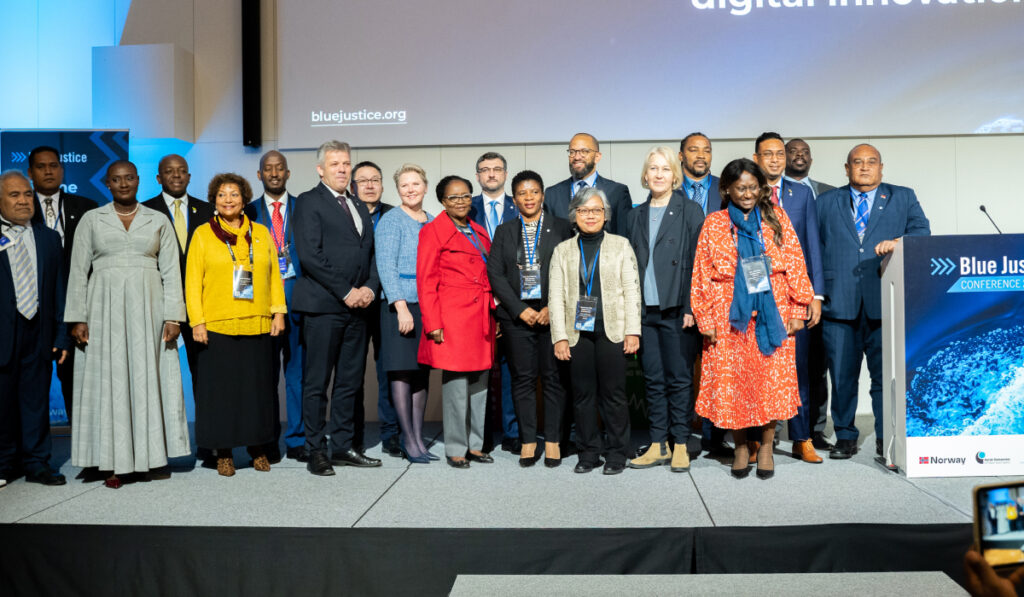
The conference featured engaging insights from 38 ministers who shared their countries’ experiences in fighting fisheries crime. The importance of inter-agency and transnational cooperation, effective surveillance, digital tools and stronger enforcement were common themes throughout. H.E. Abraão Aníbal Barbosa Vicente, Minister of the Sea, Cabo Verde, shared his view that to efficiently attain global impacts, one needs implementation of global actions by local governments “that know (their) realities and know (their) coastal zones.” While H.E. Avinash Singh, from the Ministry of Agriculture Land and Fisheries, Trinidad and Tobago spoke of the benefit of information on the tracks and patterns of vessels operating in their EEZ (Exclusive Economic Zone) provided by the Blue Justice Community platform in collaboration with the Blue Justice Tracking Centre. The minister went on to hail the community as a tool that “aids the fight against illegal, unreported and unregulated fishing (IUU).” H.E. Parmanand Sewdien, Minister of Agriculture, Animal Husbandry and Fisheries, Suriname described the tool as “creating a basis for greater collaboration and sharing of information.” The Blue Justice Community platform, administered by the UNDP Blue Resilience project, serves as an information hub for collaboration, knowledge sharing, and access to digital tools like tracking data, helping to empower local governance.
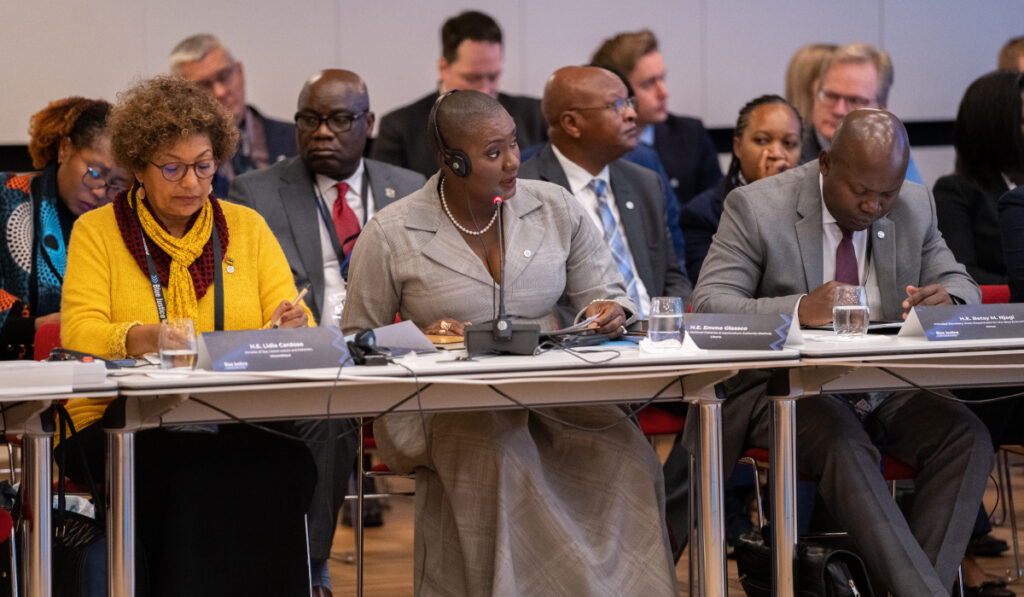
H.E Emma Glassco, Director General of the National Fisheries and Aquaculture Authority, Liberia, highlighted the detrimental effect of fisheries crime on vulnerable coastal nations such as Liberia “where full enforcements of state laws and regulations are mostly non-existent” and called for well-coordinated international action to “provide no safe havens for preparators” and to “send a strong message to those engaged in this act that anywhere or everywhere you go we will be there to take actions”. To increase impact, H.E. Carmen Evelize Dos Santos, Minister of Fisheries & Marine Resources, Angola called for such coordinated action to be implemented “on local, national, regional and global levels”.
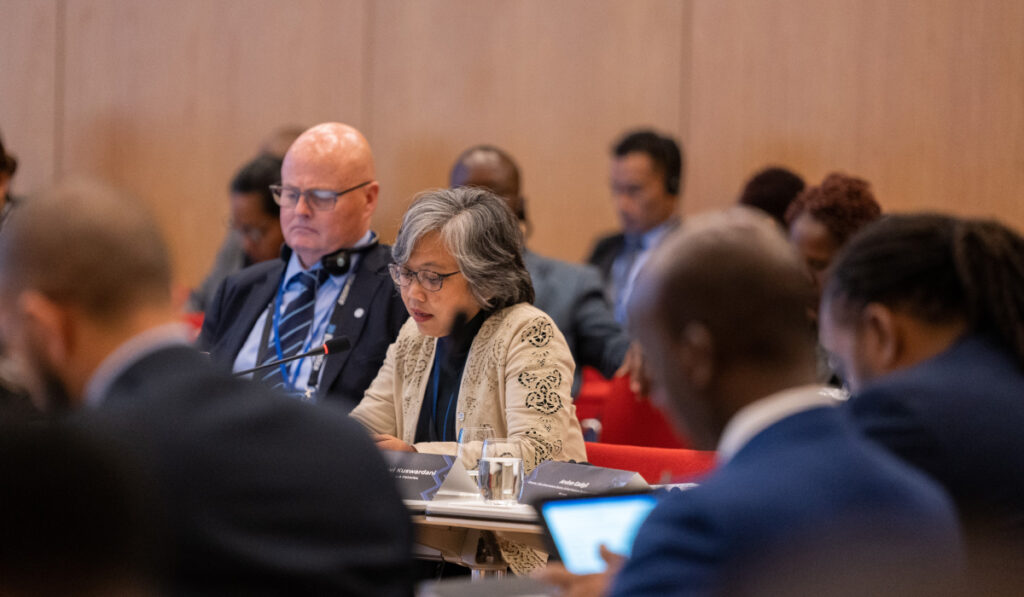
H.E. Fernando Mattos Costa, Minister of Livestock, Agriculture and Fisheries, Uruguay, stressed that measures to fight organised crime in fishing must also be taken by markets that buy products of IUU fishing. The need for transparency and traceability through the whole value chain was emphasized further by Anastasia Rita Tisiana Dwi Kuswardani, Head of Delivering Unit on behalf of the Minister of Marine Affairs and Fisheries, Indonesia, who spoke of how “a transparent fish market and supply chain will incentive the fishery business (to stop fisheries crime) and promote compliance.”
Addressing the plenary, the director of the Norwegian space agency, Christian Hauglie-Hanssen, spoke of the potential of digital solutions, and in particular satellites, to contribute to sustainable fisheries and SDG14 ‘life below water’, highlighting that increased data is key to regulating the vast ocean. When speaking about the importance of data sharing and transparency he emphasized that, ‘we have to share what we have, and we have to use that for the common good.’ The Norwegian Space Agency and their fleet of AIS satellites are a key partner to the Blue Justice Initiative, assisting to identify suspected incidents of fisheries crime, build legal cases and bolster enforcement efforts.
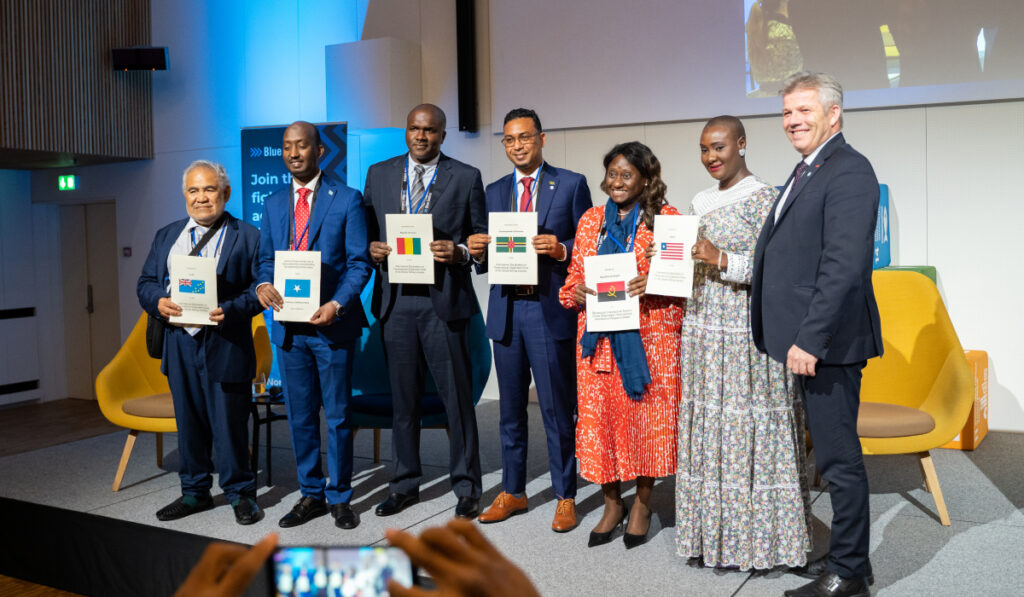
The conference saw a total of nine new countries ratify the Copenhagen declaration (three signed on via video on livestream) bringing the total to 60 nations committed to jointly fight organized crime in the fisheries sector: Angola, Barbados, Côte d’Ivoire, Dominica, the Republic of Guinea, Madagascar, Mauritania, Somalia, and Tuvalu. 37% of all coastal UN member states worldwide are now committed to joint action. The declaration was hailed by UNDP’s Assistant Secretary General Ulrika Modéer as a “unique platform of learning, knowledge sharing and action… [that] underscores the centrality of cross-sector global cooperation in addressing [fisheries crime].” This complements UNDP’s broader global commitment to the sustainable use of the ocean and its resources.
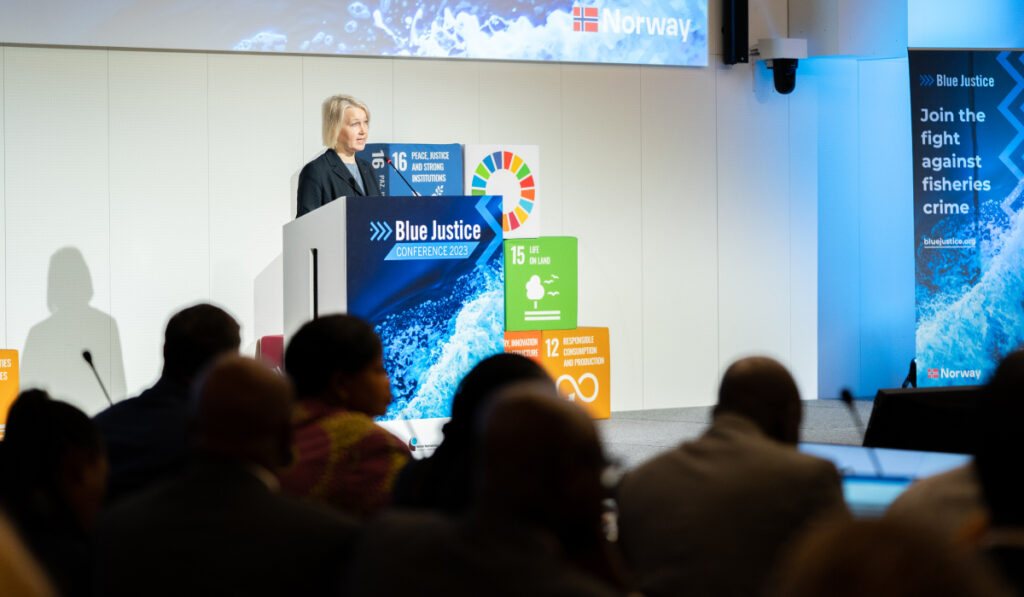
The UNDP Oslo Governance Centre in collaboration with the German Institute of Development and Sustainability launched the Connections that Matter report, which explores associations between SDG16 and SDG14, via analysis of links between governance indicators and the sustainability of fisheries. The study emphasized the importance of stakeholder engagement for marine protection efforts, as it creates trust, ownership, and cooperation. Findings were indicative that participatory and inclusive institutions are key to developing sustainable fisheries. This sentiment was echoed by Hon. Charles Pearnel, Jamaica who stated, “The people must be part of this process.”
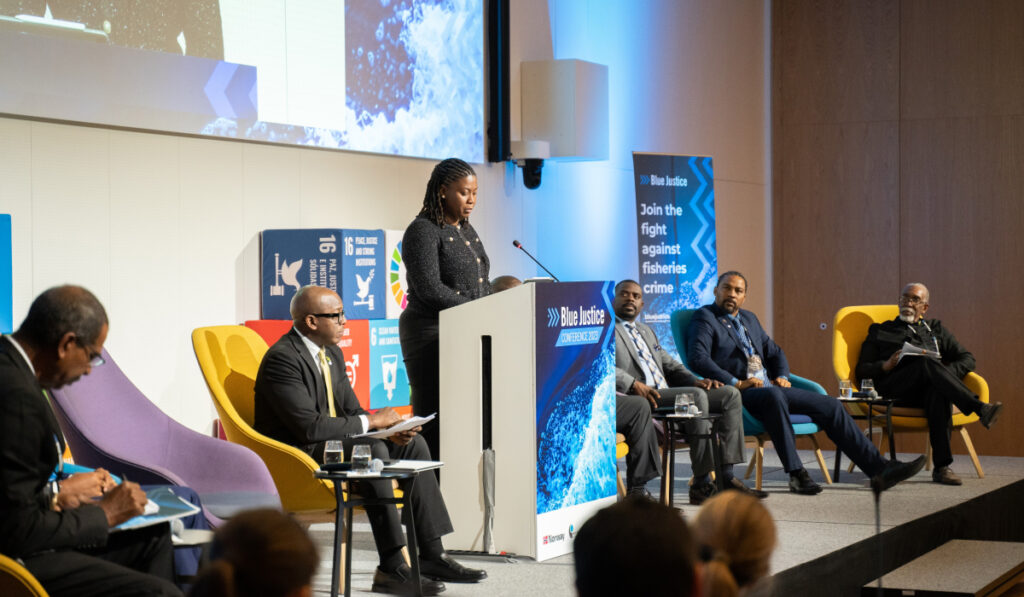
The conference also saw the launch of the Blue Justice Caribbean Hub, to be hosted in Jamaica. The Hub, supported by the 14 CRFM members across the region, will facilitate increased collaborative monitoring, surveillance, and control of the region’s fisheries, with a mandate to promote capacity building, information exchange and communication, towards inter-agency cooperation on fisheries crime. As a regional focal point for addressing fisheries crime, the hub will respond to the needs identified by the region, for the region. The hub, utilizing the Blue Justice Community Platform and facilitated by UNDP support, will develop and sustain effective regional interagency cooperation, information exchange and data analysis pertaining to fisheries crime. Hon. Charles Pearnel, Ministry of Agriculture and Fisheries, Jamaica, spoke of the potential for the hub to be “a space for communication and exchange” on addressing fisheries crime and to foster increased food security and social mobility “for those who are depending on us and those we serve.” The Blue Justice Carribean Hub is the first regional Blue Justice hub to be established under the UNDP Blue Resilience project together with the Blue Justice Initiative and is receiving favourable support region.
Speaking about the importance of the UNDP-administered Blue Justice Community platform to the facilitating the goals of the Blues Justice Caribbean Hub, UNDP’S Dr. Emma Witbooi, Blue Resilience project manager, explained that:
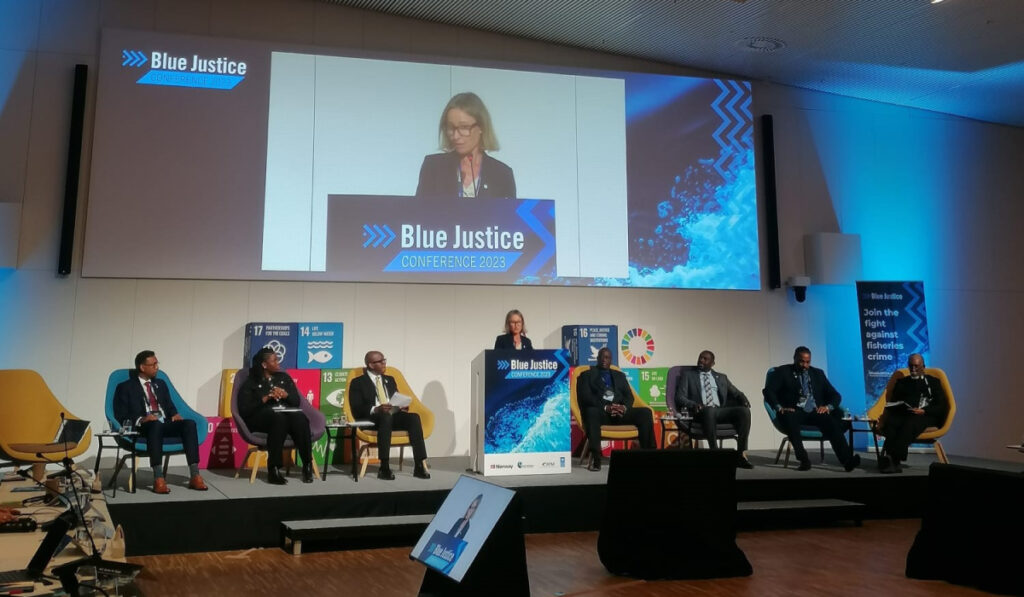
“The Blue Justice Community provides the digital ‘Town Hall’ as it were for these hubs and for this Blue Justice Caribbean Hub. It’s here where information can be safely exchanged and data analysis can take place, but also where government agencies can connect, where they can talk communicate and where they can build the trust that is absolutely vital to be able to jointly deal with the challenge”
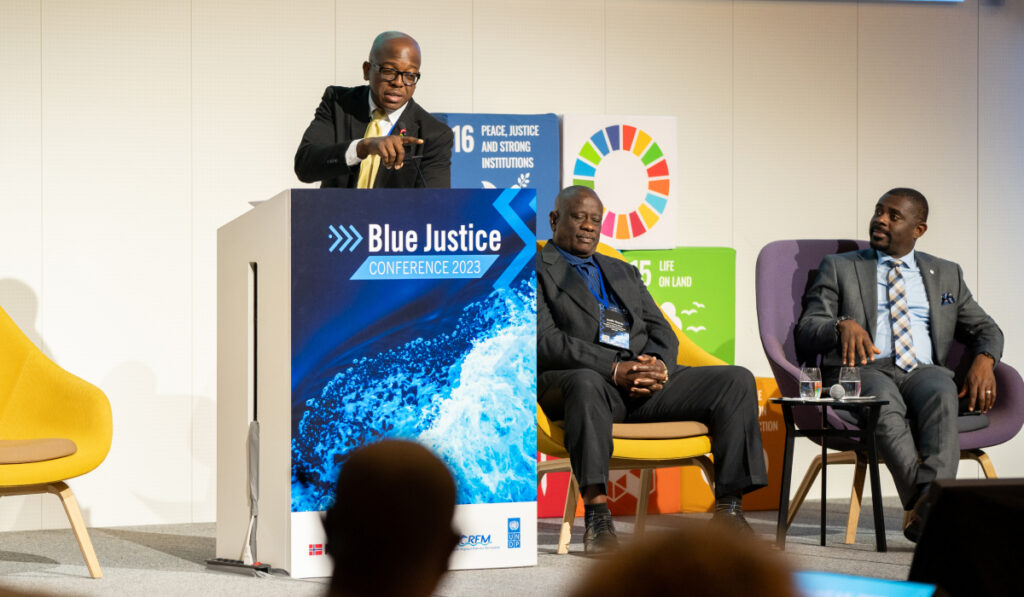
On the second day of the conference, the Blue Justice Action Forum was held. A select invited group of technical officers, substantive experts, and operational representatives, gathered for a UNDP-facilitated multi-country Blue Action Dialogue. At this multi-agency, international tabletop exercise over 60 global participants engaged in hands-on capacity and technical training, aimed at advancing inter-agency cooperation in the fight against fisheries crime.
The success of the Blue Justice Conference 2023 provides impetus in the fight against fisheries crime and is a strong example of the success that can be achieved: “together as one… together we can”, in the words of H.E. Crenston C. Buffonge, Montserrat.
You can view day one of the event on our YouTube channel and catch up with the day’s events as they happened on the UNDP Blue Resilience Twitter